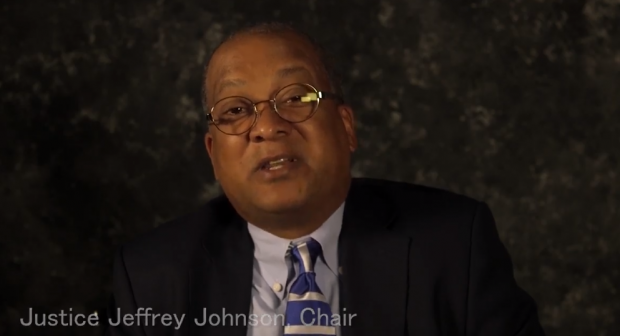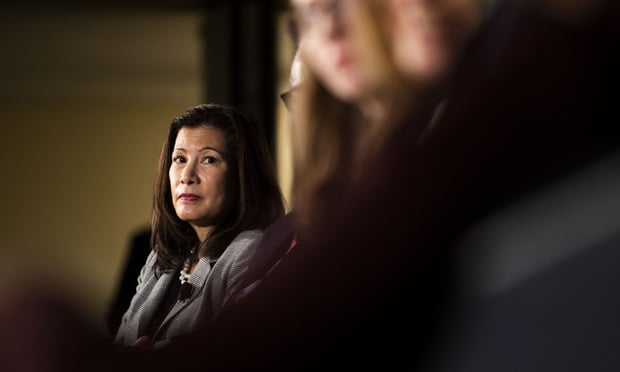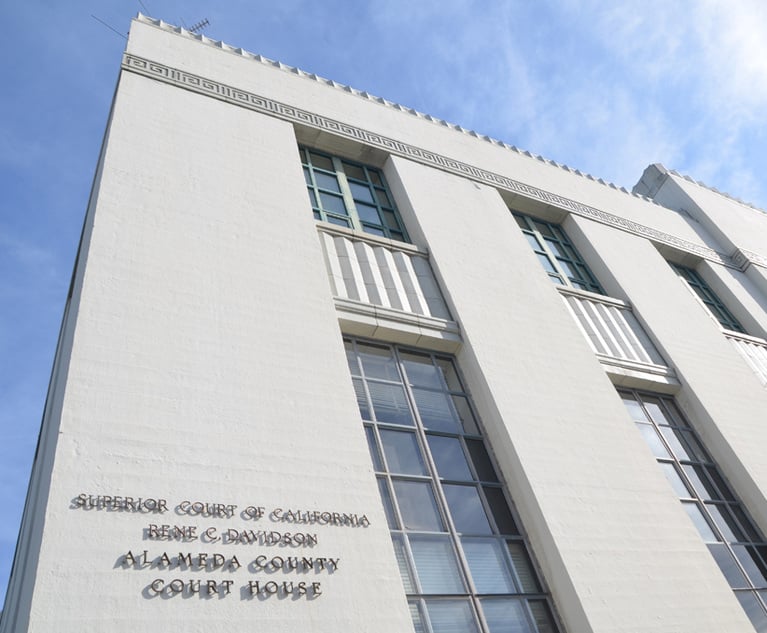Judiciary Leaders Mum on Latest Sexual Misconduct Claims
A lawyer for Justice Jeffrey W. Johnson says he "will rely on facts and documents to provide the truth." One former state appeals judge put it this way: "There's not a whole lot of precedent for this kind of thing."
January 18, 2019 at 08:59 PM
7 minute read
 Justice Jeffrey Johnson. (Photo: CalCourts via YouTube)
Justice Jeffrey Johnson. (Photo: CalCourts via YouTube)
Revelations this week that Los Angeles state appellate Justice Jeffrey W. Johnson has been accused of harassing more than a dozen women, including colleagues on the Second District bench, have raised fresh questions about how California's judicial branch handles sexual misconduct complaints against judges.
The allegations revealed by the Commission on Judicial Performance are not, by themselves, rare. Judges have been accused of harassment, making crude remarks and drunken behavior throughout the history of the commission's 59-year history of disciplining jurists.
What is unusual in this case is the breadth of the allegations, their target and the ranks of the complainants. Disciplinary charges against appellate justices are rare, both because there are fewer justices than trial court judges and because applicants for the courts of appeal usually have longer resumes to expose potential problems during vetting by a governor.
The commission's charging documents against Johnson alleged a pattern of misbehavior back to 1999, when he was a federal magistrate, and involving 16 women who are named in the notice of formal proceedings. One of those accusers is Second District Justice Victoria Gerrard Chaney, who told the commissioner that Johnson touched her breast on two occasions. Chaney did not return messages seeking comment.
Retired Justice Thomas Hollenhorst of the Fourth District Court of Appeal, a former judicial ethics instructor, said he could not remember another discipline case involving the scope and duration of the allegations against Johnson.
“There's not a whole lot of precedent for this kind of thing,” Hollenhorst said. “I was on the appellate bench for 28 years and I've never seen anything like it.”
Johnson, through his attorney, Paul S. Meyer of the Law Offices of Paul S. Meyer in Costa Mesa, has denied the charges. The justice “unequivocally passed forensic lie detector testing focused on the most serious allegations,” Meyer said. “Justice Johnson remains respectful of the process of investigation and will rely on facts and documents to provide the truth.” Johnson's formal response to the commission is due Jan. 24.
So far, the response from the judiciary's leaders has been muted. Chief Justice Tani Cantil-Sakauye, who has said she's suffered #MeToo experiences in her career, has not commented publicly about the disciplinary charges against Johnson. The Judicial Council's press office has referred most questions to the Second District.
 Tani Cantil-Sakauye, Chief Justice of California. Credit: Diego M. Radzinschi/ ALM
Tani Cantil-Sakauye, Chief Justice of California. Credit: Diego M. Radzinschi/ ALMSecond District executives have declined to say specifically when complaints were first made about Johnson, whether he is still working from courthouse chambers, whether the court has a clear path for reporting alleged wrongdoing by justices, and what steps, if any, the court takes to ensure safe working environments.
“The Second Appellate District does not comment on confidential personnel matters or matters pending before the Commission on Judicial Performance,” clerk executive officer Daniel Potter said in an email to The Recorder. “However, the court is committed to providing a work environment free of all forms of harassment and discrimination. The court has policies regarding reporting and resolving harassment complaints and provides sexual harassment prevention training to all justices and staff.”
Johnson continued to hear oral arguments as late as October 2018, and he authored an unpublished opinion issued Jan. 15. It's unclear if he will hear arguments on Division One's two-day calendar at the end of the month. Potter declined to say what Johnson's status is on the bench. The judicial commission can suspend a judge with pay once it starts formal proceedings. It did not suspend Johnson, Gregory Dresser, the commission's director and chief counsel, said Friday.
Johnson's path forward is spelled out in the state constitution and the rules governing the Commission on Judicial Performance. He will have a chance to present evidence and cross-examine witnesses at a public hearing—no date has been set yet—overseen by special masters.
The allegations against Johnson follow complaints made against former Sixth District Justice Conrad Rushing in 2017. Rushing, presiding justice of the San Jose appellate court, retired while facing allegations of sexual harassment and discrimination brought by court employees. The Commission on Judicial Performance took no public action against the justice.
Branch leaders, then, would not explain how workplace complaints against a presiding justice should be handled.
“My understanding, at least in this particular case, you have a justice who is the presiding justice, so there's a complaint against him,” chief administrative officer Martin Hoshino said at the time. “So where do you go with that? And after you get information that suggests something has happened here, where does it go then? It can't go to the actual person that it was about.”
Judges and justices receive training about preventing workplace harassment, Hollenhorst said. And most jurists see the issue play out in courtroom cases, he said. But he could not recall any guidance about what to do when a fellow judge or justice was accused. The idea of dealing with a justice harassing a colleague seems alien, he said.
Last summer, dozens of employees and 10 justices—including Chaney—of the First and Second districts' courts of appeal sent a petition to the Judicial Council asking it to review anti-harassment policies in the appellate courts. The petition made no mention of the Rushing complaints. It did ask for “an analysis of incidents when sexual harassment policies have failed” in the courthouse workplace.
“Current policy includes directing employees to report their complaints to supervisors and human resources officers who may then exercise their discretion as to how to respond,” the petition read. “We believe a central system external to each district would allow employees' complaints to be evaluated by a neutral individual without forcing employees to report directly to their supervisor or supervisor's colleagues.”
In October, Cantil-Sakauye—not alluding to the petition—announced the creation of a working group for the prevention of discrimination and harassment. That group is chaired by Presiding Justice Brad Hill of the Fifth District Court of Appeal and Sacramento County Superior Court Judge Stacy Boulware Eurie. Boulware Eurie said the panel of jurists, court executives and attorneys has met twice so far and hopes to issue recommendations to the Judicial Council by late summer.
Read more:
LA Appeals Judge Accused of Groping Colleague Faces Misconduct Charges
Retired Contra Costa County Judge Hit With 'Most Severe Level of Discipline'
Two Trial Court Judges Disciplined for Poor Demeanor on the Bench
Inside The Recorder's Request for Judicial Workplace Harassment Records
Misconduct Claims Against Appellate Judge Raise Novel Workplace Questions
This content has been archived. It is available through our partners, LexisNexis® and Bloomberg Law.
To view this content, please continue to their sites.
Not a Lexis Subscriber?
Subscribe Now
Not a Bloomberg Law Subscriber?
Subscribe Now
NOT FOR REPRINT
© 2025 ALM Global, LLC, All Rights Reserved. Request academic re-use from www.copyright.com. All other uses, submit a request to [email protected]. For more information visit Asset & Logo Licensing.
You Might Like
View All

Fresh lawsuit hits Oregon city at the heart of Supreme Court ruling on homeless encampments
4 minute read

Trending Stories
Who Got The Work
J. Brugh Lower of Gibbons has entered an appearance for industrial equipment supplier Devco Corporation in a pending trademark infringement lawsuit. The suit, accusing the defendant of selling knock-off Graco products, was filed Dec. 18 in New Jersey District Court by Rivkin Radler on behalf of Graco Inc. and Graco Minnesota. The case, assigned to U.S. District Judge Zahid N. Quraishi, is 3:24-cv-11294, Graco Inc. et al v. Devco Corporation.
Who Got The Work
Rebecca Maller-Stein and Kent A. Yalowitz of Arnold & Porter Kaye Scholer have entered their appearances for Hanaco Venture Capital and its executives, Lior Prosor and David Frankel, in a pending securities lawsuit. The action, filed on Dec. 24 in New York Southern District Court by Zell, Aron & Co. on behalf of Goldeneye Advisors, accuses the defendants of negligently and fraudulently managing the plaintiff's $1 million investment. The case, assigned to U.S. District Judge Vernon S. Broderick, is 1:24-cv-09918, Goldeneye Advisors, LLC v. Hanaco Venture Capital, Ltd. et al.
Who Got The Work
Attorneys from A&O Shearman has stepped in as defense counsel for Toronto-Dominion Bank and other defendants in a pending securities class action. The suit, filed Dec. 11 in New York Southern District Court by Bleichmar Fonti & Auld, accuses the defendants of concealing the bank's 'pervasive' deficiencies in regards to its compliance with the Bank Secrecy Act and the quality of its anti-money laundering controls. The case, assigned to U.S. District Judge Arun Subramanian, is 1:24-cv-09445, Gonzalez v. The Toronto-Dominion Bank et al.
Who Got The Work
Crown Castle International, a Pennsylvania company providing shared communications infrastructure, has turned to Luke D. Wolf of Gordon Rees Scully Mansukhani to fend off a pending breach-of-contract lawsuit. The court action, filed Nov. 25 in Michigan Eastern District Court by Hooper Hathaway PC on behalf of The Town Residences LLC, accuses Crown Castle of failing to transfer approximately $30,000 in utility payments from T-Mobile in breach of a roof-top lease and assignment agreement. The case, assigned to U.S. District Judge Susan K. Declercq, is 2:24-cv-13131, The Town Residences LLC v. T-Mobile US, Inc. et al.
Who Got The Work
Wilfred P. Coronato and Daniel M. Schwartz of McCarter & English have stepped in as defense counsel to Electrolux Home Products Inc. in a pending product liability lawsuit. The court action, filed Nov. 26 in New York Eastern District Court by Poulos Lopiccolo PC and Nagel Rice LLP on behalf of David Stern, alleges that the defendant's refrigerators’ drawers and shelving repeatedly break and fall apart within months after purchase. The case, assigned to U.S. District Judge Joan M. Azrack, is 2:24-cv-08204, Stern v. Electrolux Home Products, Inc.
Featured Firms
Law Offices of Gary Martin Hays & Associates, P.C.
(470) 294-1674
Law Offices of Mark E. Salomone
(857) 444-6468
Smith & Hassler
(713) 739-1250






